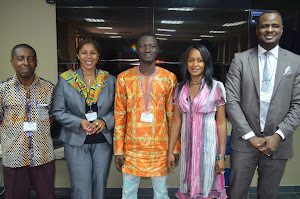 |
| Mr Paul Polman, UNILEVER CEO with other speakers behind him at the forum. |
Delivering the keynote address at an international carbon forum in Marrakech dubbed “360o on Carbon”, Mr Polman, who outlined current trends towards a low carbon energy future and the important role carbon pricing mechanisms were playing in business planning, stated that “200 of the world’s top companies saved over $1 billion last year through the use of clean energy.”
He also said that globally “$34 trillion dollars of Assets Under Management (AUM) are calling for a price on carbon,” adding that the adoption of carbon pricing mechanisms in China would be the tipping point for the rest of the world in terms of pricing carbon.”
Mr Polman was of the view that “with the addition of Chinese carbon pricing mechanisms, the world will go from 13 per cent to 20 per cent of global emissions under carbon pricing schemes.”
The two-day forum, which was on the theme “Towards a sustainable energy transformation – An inclusive conversation on the road to COP 22”, was convened by the Moroccan and French governments as well as the United Nations with support from the World Bank.
 |
| Dr Haïté interacting with a French Journalist after the Forum. |
Climate change competency centre
The COP 22 Special Envoy and Climate Champion, Dr Hakima El Haïté, who opened the forum, stated that Morocco had taken an ambitious long view towards increasing the percentage of renewables in its energy mix to decarbonise its economy.
She said to reach that goal and properly address climate change, “the Kingdom has a Climate Change Competency Centre that it would like to see play a pivotal role in linking and leading regional and international networks of such centres.”
For her part, the Director of the National Office for Hydrocarbons and Mines (ONHYM), Mrs Amina Benkhadra, shared her perspective on jurisdictions adopting carbon pricing and highlighted the conscious decision taken by King Mohammed VI to change Morocco’s energy strategy to incorporate more renewables.
 |
| Some of the African journalists at the forum. |
Carbon 360
During the conference special sessions were held on recognising national and subnational leadership in the transition towards cleaner energy mixes and highlighting the need for coherent and predictable policies to more effectively drive the decarbonisation of the global economy.
Other sessions were on strengthening synergies between the 2030 Agenda and the climate agenda and examining all sides of various carbon pricing mechanisms such as cap-and-trade and taxes.
Speakers at the forum, which brought together technical experts, government officials and private sector leaders from Morocco and around the world included the Director of the Moroccan Agency for Solar Energy (MASEN), Mr Mustapha Bakkoury; the COP22 Head of Multilateral Negotiations, Ambassador Aziz Mekouar; the Senior Director, Climate Change, World Bank, Mr John Roome and the Head of Carbon Market Development, European Bank for Reconstruction and Development (EBRD), Mr Jan-Willem van de Ven.
Writer’s email: edmund.asante@graphic.com.gh
FACTS
Morocco is a member of the Carbon Pricing Leadership Coalition.
Through its successful implementation of clean energy projects such as NOOR1, the world's largest thermal solar turbine plant that has a generation capacity of 160MW, Morocco has raised its renewable energy target from 42 per cent by 2020 to 52 per cent by 2030.





No comments:
Post a Comment